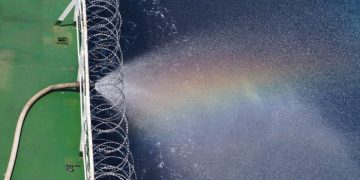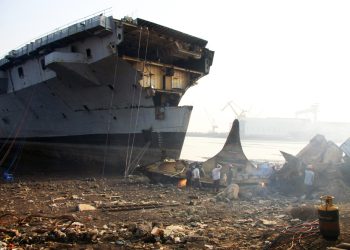Battery technology seems to be in the center of marine electrification and is seen as a solution to energy efficiency. Lithium-ion batteries are the ones that currently dominate battery technology in the shipping industry. But, using more and more batteries raises the question of their disposal in the spirit of cradle-to-grave sustainability.
Approximately ten years ago the electrification of the maritime industry started and has, now, led to a growing need for recycling, especially battery recycling. Although, right now there aren’t many batteries that reached the end of their cycle, soon there will be a need for a separate recycling loop for marine batteries.
Marine battery recycling is the reuse and reprocess of batteries that aims at decreasing the number of batteries that end up being material waste and is a very challenging process. Disposing them can have a tremendous effect on the environment because they contain poisonous chemicals and heavy metals, and can contaminate the water and soil.
Existing guidelines
Certain principles regarding recycling exist already, are really trustworthy from an economic and ecological perspective and can be used as roadmaps. One of them is the 3R principle that stands for Reduce, Reuse, Recycle. The 3R principle has positively affected the development of the safe battery system for the industry.
Reduce
- Efficient use of our resources. You produce less in order to have to dispose of less. When talking about marine batteries we have to use as little material per unit as possible.
- Invest in a long-lasting battery system. Service life is vital since a ship’s battery is used intensively and continuously during a trip. Cell chemistry is very important in providing the longest service life.
Reuse
- The goal is for produced or partial units to be put into operation for as long as possible. In other words replace faulty cells with new ones.
Recycle
- Need for recovering valuable materials in an economic and ecological way.
- Important to separate the components of the batteries in advance.
- Aluminium casing, electronics and the copper of the connectors have to be separated, reused or recycle and reprocessed remotely.
Key benefits of marine battery recycling
There is no doubt that the recycling of the batteries used onboard the vessels is crucial due to the reduction of CO2 emissions during the extraction of the raw materials needed to manufacture them. That is, though, only one of the advantages of this practice.
Other key benefits:
1. The conservation of non-renewable resources
2. The prevention of pollution
3. Reduction of solid waste that ends up in landfills
4. Energy saving
5. Job creation
6. Optimization of cost of operations
7. Energy efficiency and storage
8. Positive impact on decarbonization
9. Every piece of equipment delivers both environmental and economic goals
Safe removal and recycling of batteries during Ship Recycling
End-of-Life vessels are delivered to the Hong Kong Convention (HKC) compliant recycling facilities in India with the Inventory of Hazardous Materials (IHM) part I, II, and III. Batteries are listed, located, and quantified in the IHM. As per ship specific Ship Recycling Plan, the SOPs are prepared to remove and dispose of these batteries.
As GMS explains, only trained workers are allowed to remove the batteries. Workers are given adequate PPE, consisting of hardhat, safety shoes, gloves, overalls, glasses, and masks. Batteries that contain acids and lead are isolated from the electrical power cables, transported, and stored at designated areas in recycling facilities by trained workers. The designated area is well ventilated. The workers are made aware of the possibility of rapid charge release from the batteries and their heavyweights. Safe manual lifting practices are followed. Extra care is taken not to cause any physical damage to the batteries to avoid any acid splash (electrolyte). The workers are also trained to handle acid spills and first aid measures in case of contact is made with the acid. The batteries are sold to the authorized recyclers for recycling purposes and the battery submission manifests are maintained at the recycling yards.
Moving forward
We are still learning about the potential of battery performance and safety, and as a result we have to be very cautious during our adoption of marine batteries in general. In the light of the energy shift stringent safety standards are needed. The recycling of those batteries, specifically lithium-ion cells is very complicated. The metals are recovered through a metallurgical process at very high temperatures but not all cells can be recycled at this time. There is still a lot of Research & Development to be done in this field. Overall, commitment is key to achieving the industry’s decarbonization and net zero goals, and no one can deny the importance of energy storage aboard the vessels so as to create a new, clean energy economy. After taking all the necessary safety measures and precautions, battery usage and recycling can help walk the path of shipping decarbonization easier.


























































